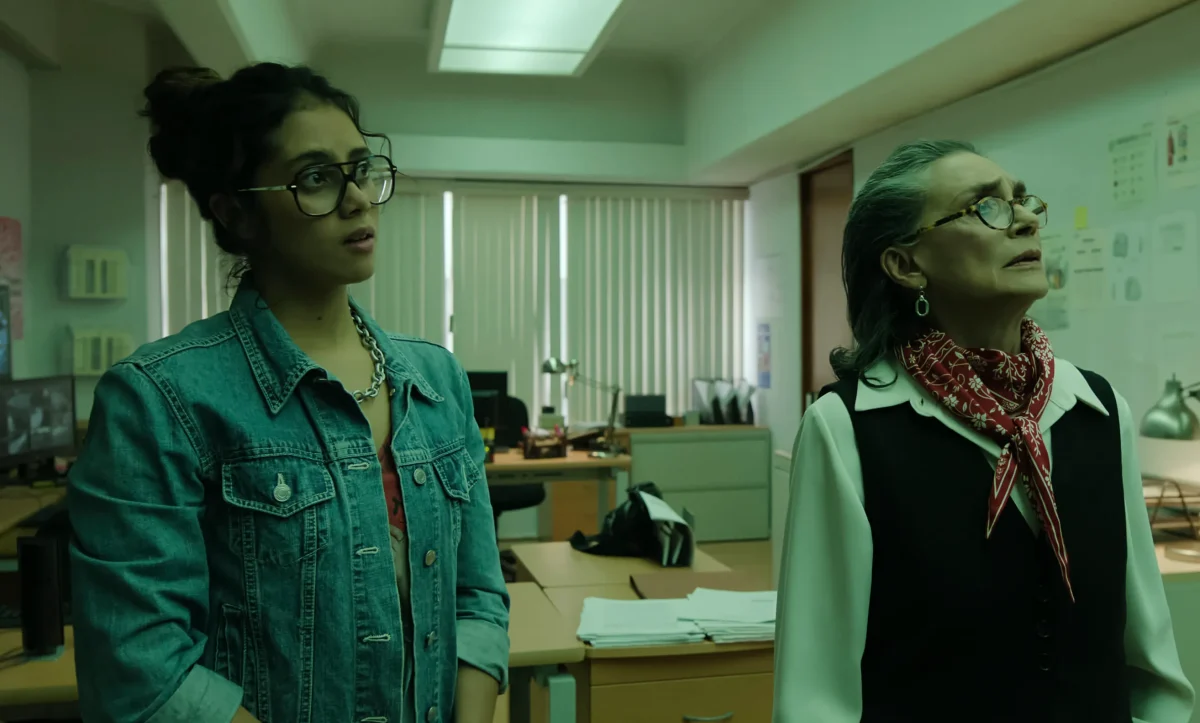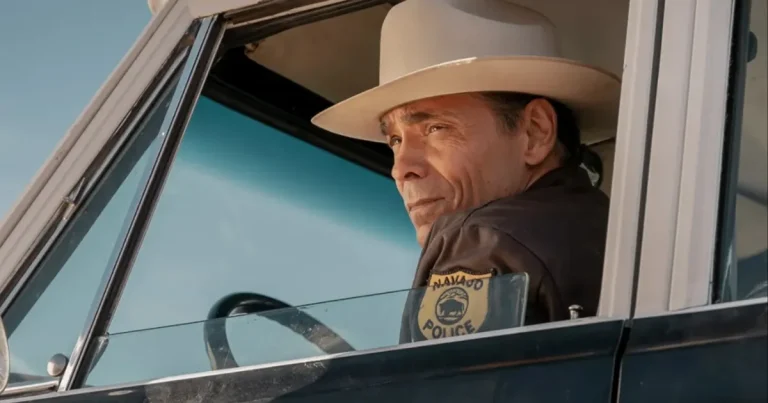In Our Times (Nuestros Tiempos, 2025), Nora and Hector—brilliant physicists from 1966—are thrust into the year 2025 after a time machine mishap. While the future is initially disorienting, it soon reveals itself as a realm of untapped potential, especially for Nora. As Hector grapples with evolving gender dynamics and a growing sense of obsolescence, Nora flourishes, discovering a long-denied freedom in both voice and vocation. Their paths begin to diverge: Hector chooses to return to the past, clinging to familiarity, while Nora stays behind, embracing a future that finally welcomes her brilliance. But is their separation truly permanent? Let’s find out.
Spoilers Ahead
Our Times (Nuestros Tiempos, 2025) Plot Summary & Movie Synopsis:
What Happens to Nora and Hector When They Use the Time Machine?
In 1966, Nora and Hector, two brilliant physicists at the National Autonomous University of Mexico, embark on a groundbreaking experiment in time travel. Driven by academic ambition and institutional pressure, they perfect a time machine after Nora solves a crucial missing element. Their initial goal is modest: travel just 15 minutes into the future to verify if the machine works. However, due to a malfunctioning analog meter and a destroyed transducer, the time machine overshoots. They land not minutes ahead but 59 years into the future, arriving in 2025, a world entirely alien to them.
Disoriented yet curious, Nora and Hector attempt to orient themselves. At a department store, they are baffled by modern devices. The receptionist’s AirPods lead them to mistakenly believe she’s deaf. Observing everyone glued to rectangular devices, they assume society has been hypnotized, a comical but telling misunderstanding. Despite the culture shock, Hector is thrilled to experience a subway that had only been a proposed project in his time. Their analytical minds remain active, trying to decode their surroundings with scientific curiosity.
Determined to return to their own time and repair the damage, they head to the university in search of the necessary parts. But their 1960s IDs make them appear delusional. When security detains them, they finally admit the truth: they’re time travelers. Unsurprisingly, the claim is met with disbelief. Yet fortune intervenes when the dean, Julia, is informed. As a former student of Nora’s, Julia immediately recognizes the truth. She had long believed in their experiment, even witnessing their secret lab as a student.
Julia’s belief changes everything. She offers full support, both institutional and financial, to help them rebuild the machine. More importantly, she connects them with contemporary scientists working on time travel. For Nora and Hector, what began as a mistake becomes a second chance. Their sudden leap into the future, while unintentional, ultimately ensures that their work receives the recognition it always deserved. Their legacy, once interrupted, is now reignited, potentially altering the future of science forever.
What Is Troubling Hector in the Future?
Hector finds himself deeply unsettled in the year 2025. While the future amazes him with technological marvels like smartphones and the internet, emotionally and socially, he struggles to fit in. He is a scientist who once dreamed of changing the world, but when that dream is finally realized, he finds the world no longer needs him the way it once did. His discomfort doesn’t stem from the science itself, but from the new social order where his authority and sense of identity are shaken. One of Hector’s primary challenges is Nora’s sudden rise in visibility and confidence. In the 60s, he and Nora worked as equals in the lab, but society didn’t recognize her equally.
Now, Nora is finally receiving the appreciation she was denied, and Hector feels pushed to the sidelines. Though he once admired her brilliance, he now resents the attention she receives. He begins to feel like an accessory to her success, not the partner he once believed himself to be. Hector also wrestles with modern gender norms and sexual openness. When Nora embraces the idea of experimenting with sexual wellness products, he is visibly uncomfortable. He disapproves not only of her purchase but of the boldness she displays, an assertiveness that defies the quiet, accommodating woman he once knew. This discomfort stems from the internalized values of his time, where such topics were taboo and male dominance in both the home and academia went unquestioned.
The turning point in Hector’s downward spiral comes during a conference on International Working Women’s Day. Jealous and bitter, he interrupts Nora to assert his authority. His actions reveal his growing insecurity and desperation to reclaim relevance. When the audience supports Nora and celebrates her ideas, Hector realizes he no longer commands the admiration he once did. He walks out, defeated and resentful. Hector’s public meltdown and the viral video of his complaints about the sorry state of men underscore his alienation. He longs for a return to the values of the 60s, not because they were just, but because they upheld his position. Ultimately, Hector is troubled because the future doesn’t threaten his science; it threatens his identity.
Why Does Hector Decide to Leave Nora?

Hector decides to leave Nora because, for the first time in their lives, their paths diverge not due to failure, but because of transformation. Hector always believed that no matter how far they traveled, scientifically or temporally, they would return together to the world they knew. He clings to the past, both literally and emotionally. For him, the 1960s represent certainty, familiarity, and control. But Nora, having tasted freedom and recognition in 2025, no longer sees the past as home. Nora’s decision is shaped by the guilt she feels over her sister Rebeca’s death. Learning that Rebeca died while searching for her makes Nora question the worth of returning.
But when Rebeca’s daughter, Rebequita, explains that Nora shouldn’t bear the burden of fate, Nora is forced to confront the idea that some tragedies are inevitable. This becomes a turning point for her; she realizes that undoing the past could destroy the present. Her future now lies in continuing the work she once thought was impossible. Nora is no longer bound by the gender roles of the 1960s. In 2025, she finds a space where her voice matters, where her theories are acknowledged, and where she is free from being defined by her relationship. Hector, however, struggles with this shift. He never imagined a version of Nora that didn’t orbit around their shared life. When she chooses to stay, not because of him but despite him, it shakes the foundation of his identity.
Hector’s departure is not impulsive; it is a reluctant surrender. He leaves behind a note that reveals his internal conflict. While he still loves Nora deeply, he understands that his presence has become a weight. Watching her thrive makes him realize that she deserves a life free from the limitations of his worldview. He admits that he is stuck in the past, and to remain by her side would only anchor her to it.
He chooses to let her go, not out of anger or rejection, but out of love and recognition of her potential. In the end, Hector leaves because he sees that love alone is not enough. Their love was once rooted in shared ambition and struggle, but now, time has redefined them. He walks away so she can move forward.
Our Times (Nuestros Tiempos, 2025) Movie Ending Explained:
Does Nora Stay in the Future, Allowing Hector to Go in the Past?
Yes, Nora chooses to stay in the future, allowing Hector to return to the past. It is not an easy decision. When Hector leaves, Nora is devastated. She feels emotionally shattered without the man who had always been her partner in life and science. But her grief is counterbalanced by a powerful realization: this is the time in which she truly belongs, professionally and intellectually. Julia, now a respected figure in the scientific community and Nora’s strongest support system, reminds Nora of her capability. Though the original time machine is lost, Julia urges Nora to live fully. She assures her that Nora’s mind holds the blueprint to start again. And so, Nora does just that. She channels her heartbreak into scientific dedication. The future welcomes her in ways the past never did, and this acceptance transforms her.
Over the next thirty years, Nora thrives. She receives acclaim for her contributions and becomes one of the most influential women of the century. Her achievements in science not only bring her fulfillment but also push the boundaries of human understanding. While she often misses Hector, she knows that the 1960s would have clipped her wings. In choosing to remain in 2025, she chooses her growth, potential, and identity. When the wormhole reopens after three decades, Nora seizes the chance to reunite with Hector. She travels to 1996, having spent years perfecting her version of the time machine. This moment proves that though Nora and Hector chose different timelines to pursue their ambitions, their love was never lost. They both sacrificed companionship for progress, but in doing so, they discovered a way to meet once again, on their terms.
Nora’s choice to stay was both a personal and political act. She rejects the limitations of her original era and redefines what it means to be a woman in science. And in the end, despite their different journeys, she and Hector find each other again. They don’t belong to the past or the future anymore, they belong to each other, in a time they created.






